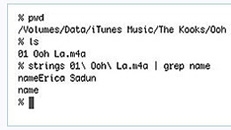Apple chastised over privacy of DRM-free media
Apple has found itself in the middle of a firestorm of controversy over privacy issues involving newly released DRM-free media.
Without any notification to customers, Apple, who released first DRM-free music at midweek, is embedding the names and e-mail addresses of the buyer in every iTunes release sold. The information is unencrypted and easily visible to anyone using the proper software.
News of the practice, which extended to the original copy-protected iTunes releases, became a hot topic on Web sites. The Electronic Frontier Foundation (EFF), the consumer watchdog group that focuses on digital technology issues, has expressed great concern with the practice of embedding customer information within iTunes music.
Apple has remained quiet on why the information is being embedded and how it might be used. Adding to the mystery, beyond the embedding of personal information are reports from Ars Technica and TUAW of unexplained file size increases — about 360KB — in DRM-free files, which are called iTunes Plus and are priced at a premium over DRM-protected files.

That extra 360KB of information, found after duplicating Apple’s encoding process, raised questions of whether there might be some new type of watermarking technology employed that could track the use of the music files. Watermarking would provide the music industry with a way to identify the owner of a media file.
The issue highlighted the growing distrust and contentiousness between content owners, who are employing increasing harsh legal tactics, and customers, who insist on the freedom to use legally purchased media as they choose.
The professional video industry's #1 source for news, trends and product and tech information. Sign up below.
